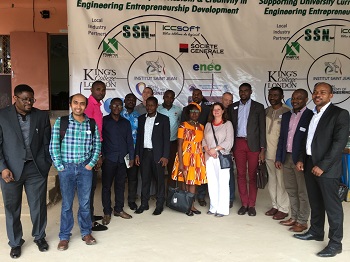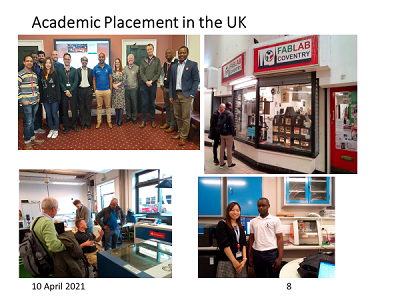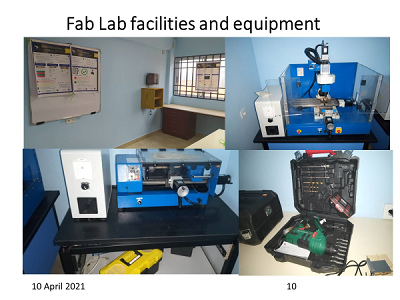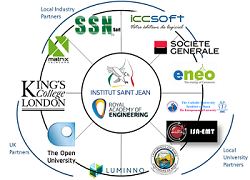Supporting University Curriculum & Creativity in Engineering Entrepreneurship Development (SUCCEED)
Introduction
SUCCEED is a UK-Cameroon academic-industry network that enhances curriculum design in local universities with a view to producing enterprising engineers who are capable of securing employment and/or commercialising locally developed innovations.
The network will design, launch and sustain a Fab Lab to support practical and creative engineering programmes.
Our aims
This project seeks to renew and adapt engineering curriculum content with a view to producing enterprising engineers who are capable of securing employment and/or commercialising locally developed technology innovations.
In this technological age and developing economy context it is our belief that this learning needs to happen in a practical manner, facilitating entrepreneurship where possible. Therefore, central to this curriculum development will be the design and launch of a Fab Lab to support practical and creative engineering programmes.
The Fab Lab will provide engineering students with the physical (workspace) and technological infrastructure necessary for the deployment and scaling of technical applications, entrepreneurship training/workshops and access to networking with industry partners (e.g. investors, business/legal advisers). The space is, above all, a way of putting into practice hard-learned and relevant curriculum content. Entry and exit policies will ensure an increasing number of engineering entrepreneurs, whilst at the same time particularly encouraging female engineering entrepreneurs.
Project
Phase One - Creating an academic-industry network (November 2018 – April 2019)

Project members and collaboration partners at the launch event in Yaoundé, Cameroon
We launched SUCCEED as an international academic-industry network consisting of universities, industry organisations and government agencies in United Kingdom and Cameroon. Through a workshop and kick-off meeting in Yaoundé, Cameroon, we shared experiences on existing examples of engineering entrepreneurship, the difficulties / opportunities and how the network will work together to contribute to addressing them.
Research-informed public engagement: Prior to the launch we conducted action research reviewing and evaluating the existing engineering curriculum to align with the opportunity for students to make the most of an innovative engineering facility, including engineering entrepreneurship. The written report was shared with participants providing a context for a half-day workshop that was part of the project launch. There were also presentations by two government Ministries who spoke about how government agencies can work with partners to promote entrepreneurship in engineering education - Ministry of Research and Scientific Innovation and Ministry of Small and Medium-Sized Enterprises and Handicraft. The event was also covered by the local media .
We launched a competition to providing opportunities for students to develop digital skills by creating gender-balanced student groups to design a project website for SUCCEED. Titled the “GOAL Event”, a 48-hour brainstorming between the student teams from across four local participating universities, supported by their respective staff develop ideas for the mission and activities that should be pursued by SUCCEED. The outcome of this event will be used as input for the next phases of the project and thereby ensuring the active involvement of students working together.
Phase Two - Academic-industry placement activities (May 2019-October 2019)

Two Cameroon project members visiting and learning from Fab Labs in the UK and developing networks for future collaboration
Designing a Fab Lab: Through the action research conducted in Phase One, we produced a business plan for creating an up and running Fab Lab at the premises of Institut Saint Jean in Yaoundé. To realise SUCCEED a hub is being set based on the Fab Lab model, a physical facility for collaborative product design, prototyping, modelling, education and training or consultancy and the viability of this can take place on a not-for-profit or commercial basis, or both; enhance and develop a network of engineers within local universities; and a resource in the wider society, for training, partnerships and projects.
Two-week Academic placement at the Wheastone (Fab Lab) at Kings College London. As part of this placement, two Hub University’s SUCCEED Managers develop and built relationships with universities and Fab Labs in the UK. The activities undertaken include conducting a range of design activities at the Wheatstone (Fab Lab) at Kings College (meetings with associated staff, sharing of policies and operating procedures, training in use of key pieces of equipment, how to support spin out businesses and training in use of supporting tools for student entrepreneurs). The Cameroon visitors also attended sessions at other Fab Labs in the UK, including Coventry lab (Community oriented), Imperial Enterprise Lab at Imperial College London, Cardiff Fab Lab in Wales, Maker Space at University College London, University College London Innovation and Enterprise and GreenLab.
One-day workshop on academic-industry collaboration in the UK, organised at Kings College London, where participants shared the UK and international perspectives on different models, the nature of student, business and community engagement and capturing and sharing impacts.
Phases Three and Four – Up and running Fab Lab, capacity building workshops and project evaluation (November 2019 – April 2021)
To address the difficulty of implementing an international project due to Covid-19 travel restrictions, we designed a credible alternative for combining and delivering the final two phases of the project in a blended format.
Launch of Fab Lab. Industry and academic partners were matched with student teams to work on prototyping projects that targeted real problems in Cameroon. Within the lab, students worked on industry project; this reduces prototyping cost for companies while realising prototypes at low-cost. Examples of projects that the students have worked on include:
- Energy: renewable energy projects with solar panels
- Security: community surveillance systems
- Health: problem of constantly monitoring blood pressure
- Health: BabyCare (monitoring baby health)
- Agriculture: Storage facilities (Crop Bank) for farmers

A selection equipment in the new Fab Lab
Capacity building. We designed and delivered a ‘Managing University-Industry Collaboration’ blended learning course. A short course was created and delivered remotely to help members to share knowledge and experiences, while developing practical skills, foster meaningful collaboration, and generate ideas that matter to local people, into learning opportunities for social and economic change. The course was delivered through blended online learning. Participants studied course material uploaded on the Induct platform, completed a set of tasks and joined scheduled discussion events on Zoom to support their learning.
Fab Lab activities. Interactive training sessions in the Fab Lab were undertaken involving university students, academic and industry mentors. During the final phase of the project a tour of the Fab Lab facility for small groups of project partners and the general public were also undertaking to showcase a Fab Lab at work. The open invitation to the public to visit and tour the Fab Lab facilities were hosted by identified and trained engineering students.
Final project dissemination workshop (10/04/2021): This workshop focused on celebrating the successful completion of this UK-Cameroon collaboration and looking forward to the future of the network that has been established.
Below is a short presentation by Catriona MacArthur from the Royal Academy of Engineering, reflecting on the successes of the funded SUCCEED project within the broader Higher Education Partnership in sub-Saharan Africa (HEP SSA) programme.
Keynote presentation by Emeka Obiodu, PhD Fellow at King’s College London and Global Marketing Manager (AI & 5G) at NVIDIA , UK. The presentation is titled, “What does it mean to be a global engineer and make an impact, and the role of the entrepreneurial engineer in identifying and addressing local problems”. Emeka also hosted a virtual audience with two of the entrepreneur co-founders of CodeLN, Dexter Ouattarra and Philisiah Sanguli, who shared their journey from engineering students to setting and operating a business that facilitates access to a rich pool of verified African programmers and designers, ready to be hired by businesses around the world.
Engineering Project Pitch competition through presentations by student teams from three local universities in different regions of Cameroon to an international judging panel made up of representatives from UK and Cameroon university and industry partners. The teams received certificates of participation.
Looking to the future, the network will continue to explore and pursue new projects and is open to working with other industry partners and universities for future collaboration.
Project Members and Partners
Project Members
- Emmanuel Moupojou, Programme Manager & Lecturer, Institut Saint Jean
- Dr Michael Ngoasong, Former Senior Lecturer in Management, The Open University
- Lisa Mynheer, Director, Luminno Ltd
- Professor Nishanth Sastry, Surrey Centre for Cyber Security, University of Surrey
Spoke University Partners
- University of Engineering and Entrepreneurship, Douala, Cameroon
- Catholic University Institute of Buea, Cameroon
- College of Technology, University of Buea, Cameroon
Partner organisations
- Wheatstone Innovation Lab
A physical space (lab) for students that facilitates networking, invention and skills development by providing access to tools for digital fabrication students at the Faculty of Natural & Mathematical Sciences, King’s College London, UK - System Security Network (SSN)
A consultancy, integration company in infrastructure, engineering and security in Cameroon - ICCT SOFT
Specialise in the customisation and development of Software along with other computer engineering applications - Matrix Telecom
A specialist hub for telecommunications in Cameroon, providing IP based services and solutions - Societe General Cameroon
Commercial bank subsidiary of Societe General, particularly interested in specialist access to the Fab Lab for local innovation and social responsibility activities
 Funding body
Funding body
This project is funded by The Higher Education Partnerships in sub-Saharan Africa Programme (HEP SSA) – supported by the Anglo-American Group Foundation and the UKRI Global Challenges Research Fund and established by the Royal Academy of Engineering.
